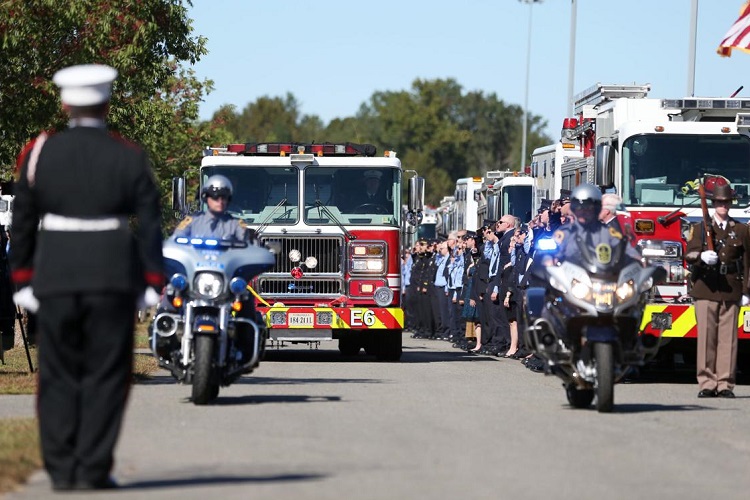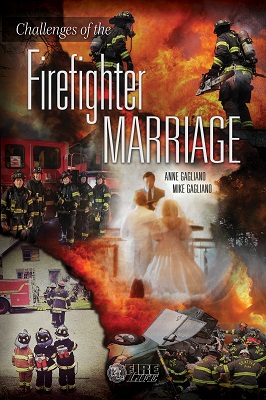

By Anne Gagliano
Melanie Clark did not attend the Fire Department Instructors Conference (FDIC) International 2019 only to accept her late husband Lt. Bradford Clark’s Ray Downey Courage and Valor award; she was there to teach a class as well. Entitled, “My Lt. Didn’t Come Home: The Devastation of Distracted Driving,” the course description read as follows:
This class highlights real-life incident where Lt. Clark died in a line-of-duty-death and two other firefighters were seriously injured during a highway incident. The program provides critical information on how Fire Departments can better prepare to operate on the roadways and what to do when things go horribly wrong, tactics for working on roadways, and key lessons on ways departments can help their responders prepare individually and as a department.
Despite my reluctance to face such a painful topic, I decided to attend this class, and I’m so glad I did.
In this emotionally charged atmosphere, Melanie Clark somehow manages to present her tale with clarity, dignity, and strength despite her shaking voice and its frequent loss. As the class unfolded, I was struck by this profound truth: the Courage and Valor Award is aptly named not only for Lt. Clark but for his fellow firefighters and, most especially, for Melanie herself. The lessons learned and conveyed by her will stay with me always, and I will share these with you all now because she deserves to have her message heard.
RELATED
A line-of-duty-death, no matter the department, is painful for all firefighters and firefighter families alike. Just reading of them in print is tough enough, but hearing of it first hand from the grieving widow herself? Nearly unbearable. Melanie’s words and descriptions are exactly how I would feel, how I would react is it were my firefighter who was killed. I honestly don’t know how she did this, to physically stand there and do this; her courage and grace under pressure absolutely blows my mind. The insights, the truths, the experiences—it all came together to reveal incredible lessons all firefighters, as well as their loved ones, should know. It was not just about how to react to tragedy, but how to prepare; to be ready; and, most importantly, how to help each other through it should the worst ever occur—what works, and what doesn’t. And, ultimately, how to rise from the ashes of overwhelming loss. These truths can only come from one who has lived it; they cannot be manufactured any other way. Following are some of the painful, precious, hard lessons learned, ones that stood out to me as someone who also loves a firefighter.
On scene. When Lt. Clark was pronounced dead on scene, his fellow firefighters were distraught. One removed his own bunker coat and reverently covered Clark with it. This touched my heart, and I thought it a fitting, noble, respectful gesture. Although it was decent, it proved, however, to be a mistake. In the grief and confusion of the scene, the deceased was misidentified as the name on the bunker coat, and subsequently a search was issued to find Clark, who was not missing, but lay under the coat.
The crew was dismissed as soon as possible as backup crews rushed to relieve them. Once a fatality has occurred, the crew should be deemed emotionally unfit to perform. This is a wise course of action for all departments to follow whenever possible.
Social media. Melanie was becoming frantic to hear what was happening, as her husband had not called her back and wasn’t answering her texts as he usually did. The news was reporting an incident, and on social media she read, “Pray for E6” (Clark’s rig). She nearly lost her mind at this. Driving erratically, she could have wrecked as she raced to the firehouse in her desperation to get word on her husband. She should not have heard that something was wrong in this way. Be very careful to keep postings off of social media until all families have been properly notified.
Clark’s fellow firefighters. As I listened to Melanie describe all that they did for her, my heart nearly burst. They did everything right and went above and beyond; the example of Hanover (VA) Fire-EMS (HFEMS) should be held up as the standard for all departments to follow. Melanie had them stand after she told of their deeds, and I was impressed that they (and even their wives) had followed her to this class to support her yet again.
The night of Lt. Clark’s death, Melanie was assigned a “liaison” from the firehouse, and he stayed by her side throughout the entire ordeal. He drove her where she needed to go and walked with her through every step (as did his wife). The chaplain came to the firehouse that very night and also aided her throughout.
Melanie said she “needed to be with the guys at the firehouse, as they were a piece of Brad,” and they made themselves available to her at all times. Melanie was too afraid to be alone with just the kids, too afraid she would not be able to “keep on living,” so the firefighters took turns sleeping on her couch every night from October through January, when she finally felt strong enough to be alone. This image of loyalty and devotion brought on a flood of tears for me; such sacrifice and dedication to her well-being, to make sure she was never alone, was powerful, touching, overwhelming. I pictured a big ol’ loving sheepdog keeping silent, devoted vigil over a fallen brother’s vulnerable family all through the night. Wow.
Not only was Melanie cared for in her intense grief, but so were the other injured firefighters as well. Two had received life-threatening injuries; they were attended to at the hospital, and their families were looked after as well.
On top of the round-the-clock care, the firefighters arranged an incredible funeral for Lt. Clark. Film clips of it were shown in this class, and it was beautifully done—a fitting tribute to a noble brother. The HFEMS did due diligence in every way and acted as more than just co-workers; they exemplified the deepest held tradition of the fire service—they behaved as family.
There are more lessons learned from Melanie’s class, more that deserve to be heard—and these I’ll continue with in my next column.
 If you’re interested in my book, Challenges of the Firefighter Marriage, check it out HERE
If you’re interested in my book, Challenges of the Firefighter Marriage, check it out HERE
Use code CFM20FL at checkout for 20% off!
Anne Gagliano has been married to Captain Mike Gagliano of the Seattle (WA) Fire Department for 33 years. She and her husband lecture together on building and maintaining a strong marriage.

